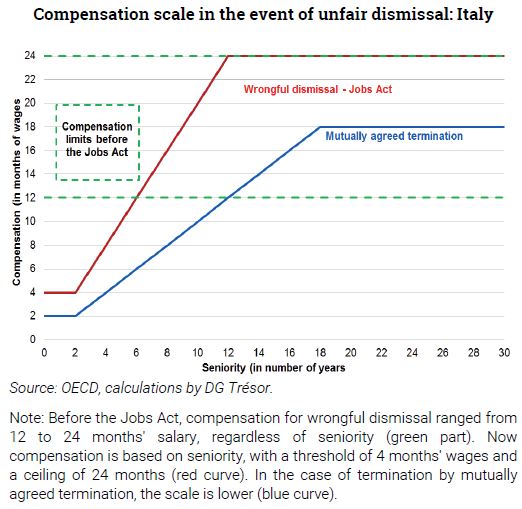Trésor-Economics No. 228 - Labour market reforms in Italy
In 2015, the Renzi government adopted a labour market reform, the "Jobs Act", in response to a relatively low labour force participation rate and a high degree of dualism in the labour market, . In addition and unlike its trading partners, productivity gains have stalled in Italy, which is becoming less competitive.
Building on the 2012 Fornero reforms, the Jobs Act relaxed protections for employees on permanent contracts by setting a fixed scale of compensation in the case of dismissal, based on seniority (see chart). In a bid to reduce legal proceedings, the Act also introduced the possibility of mutually agreed termination of the employment contract.
The Act regulates and clarifies the use of short-term contracts, especially of fixed-term contracts and so-called "atypical" contracts, the number of which has been reduced. It also introduced short-term measures in support of employment, such as temporary exemptions from employer contributions. Finally, it strengthens social shock absorbers, in particular by extending unemployment benefits.
Although the limited timespan since its implementation does not allow for a definitive assessment, the academic literature emphasises that the Jobs Act should support productivity and wages, with ambiguous effects on employment. It could also reduce the duration of unemployment spells.
Recent labour market reforms in Italy and France have made the dismissal process more flexible and have generally reduced the differences between the two countries' legislation, with respect to dismissal, fixed-term contracts and social security benefits. Whereas in France orders issued to bolster labour-management dialogue give pride of place to collective bargaining (at branch and company level), the Jobs Act does not specifically target wage negotiations. However, in April 2018, both sides of industry in Italy concluded an agreement that emphasised the need for collective agreements at both national (branch) and local (company or territory) levels.
On the 7th August 2018, the Italian Parliament enacted the so-called "Dignity Decree", which contained several amendments to the Jobs Act, including an increase in the scale of compensation in the event of unfair or mutually-agreed dismissal, and a more restrictive use of fixed-term contracts.
